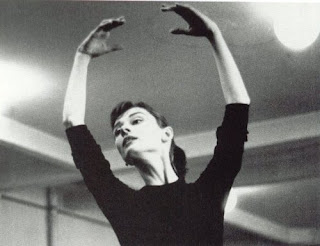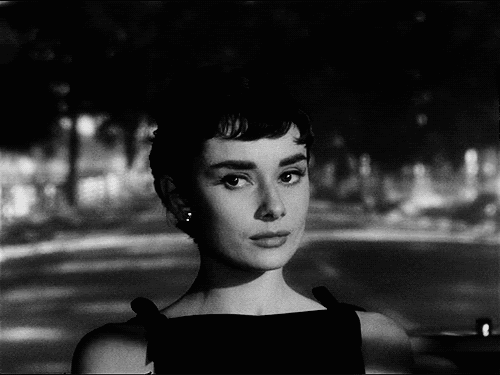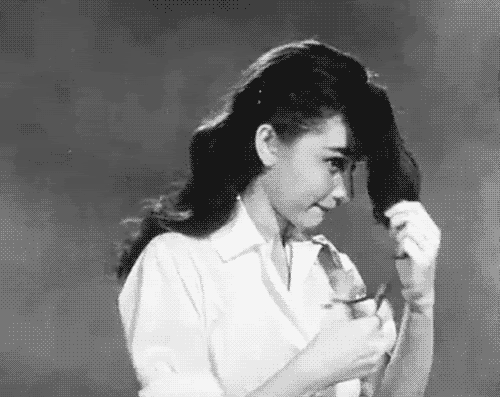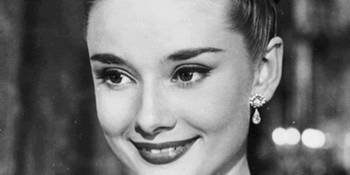5. Audrey Hepburn
(May 4, 1929 - January 20, 1992)
An Academy Award-winning actress, fashion model and a humanitarian.
Famous for: Roman Holiday 1953
Sabrina 1954
Funny Face 1957
The Nun's story 1959
Breakfast at Tiffanny's 1961
Charade 1963
How to steal a Million 1966
Married to the American actor Mel Ferrer (1954- 1968 - divorced) , and then to the Italian psychiatrist Andrea Dotti (1969 -1982 - divorced).
Born Audrey Kathleen Ruston in Brussels, Belgium, she was the only child of John Victor Hepburn-Ruston, an Anglo Irish banker, and Baroness Ella van Heemstra, a Dutch aristocrat descended from French and English kings. Her father later appended the name Hepburn to his surname, and Audrey's surname became Hepburn-Ruston. She had two half-brothers, Alexander and Ian Quarles van Ufford, by her mother's first marriage to a Dutch nobleman.
Audrey had the reputation of being a humble, kind and charming person, who lived the philosophy of putting others before herself. She showed this side particularly towards the end of her life in her work for the United Nations Children's Fund (UNICEF). New Woman magazine called Audrey the most beautiful woman of all time, in a 2006 poll. She was ranked as the third greatest female star of all time by the American Film Institute.
Audrey attended private schools in England and the Netherlands. Her mother was very strict and her father left the family when Audrey was young. She later called his abandonment the most traumatic moment of her life (years later she located her father and sent him money and wrote him many letters).
During the Dutch famine over the winter of 1944, brutality increased and the Nazis confiscated the Dutch people's limited food and fuel supply for themselves. Without heat in their homes, or food to eat, people in the Netherlands starved and froze to death in the streets, particularly so in Arnhem, which was devastated during allied bombing raids that were part of Operation Market Garden. Suffering from malnutrition, Audrey developed several health problems. She would stay in bed and read to take her mind off the hunger, and she danced ballet for groups of people to collect money for the underground movement. She resorted to digging up and eating tulip bulbs to survive the famine. The impact of these times would shape her life and values.
After the war, Audrey and her mother moved to London, where she studied ballet, worked as a model, and in 1951, began acting in films, mostly in minor or supporting roles as Audrey Hepburn. She got into acting mainly to make money so that her mother would not have to work menial jobs to support them. Her first major performance was in the 1951 film The Secret People, in which she played a ballet dancer. Audrey had trained in ballet since childhood and won critical acclaim for her talent, which she showcased in the film. However, her ballet teachers had deemed her "too tall" to be a professional ballet dancer, since, at 5'7", she was taller than many of the male dancers. She was chosen to play the lead character in the Broadway play Gigi that opened on 24 November 1951. She won a Theatre World Award for her debut performance, and it had a successful six-month run in New York City.
Audrey was then offered a starring role opposite Gregory Peck in the Hollywood motion picture, Roman Holiday. Peck saw her star quality and insisted she share top billing. For her performance, she won the 1953 Academy Award for Best Actress. Years later, when asked by Barbara Walters what her favorite film was, Audrey answered without hesitation, Roman Holiday, because it was the one that made her a star.
After Roman Holiday she filmed Sabrina with Humphrey Bogart and William Holden, with whom she had a brief romance. Many believe Holden considered Audrey to be the love of his life, and she would go on to appear with him again in the comedy Paris, When It Sizzles.

In 1954, Audrey went back to the stage playing the water sprite in Ondine in a performance with Mel Ferrer, whom she would wed later that year. For her performance in Ondine, Audrey was awarded the Tony Award for Best Actress (1954) which, coming only six weeks after her academy award for Roman Holiday, solidified her reputation as both a film and stage star.
Having become one of Hollywood's most popular box-office attractions, Audrey co-starred with other major actors such as Fred Astaire in Funny Face, Humphrey Bogart and Gary Cooper in Love in the Afternoon, George Peppard inBreakfast at Tiffany's, Cary Grant in the critically acclaimed hit Charade, Rex Harrison in My Fair Lady, Peter O'Toole in How to Steal a Million, and Sean Connery in Robin and Marian.Many of these leading men became very close to her. Rex Harrison called Audrey his favorite leading lady; Cary Grant loved to humor her and once said, "all I want for Christmas is to make another movie with Audrey Hepburn;" and Gregory Peck became a lifelong friend. After her death, Peck went on camera and tearfully recited her favorite poem, "Unending Love." Some believe Bogart and Audrey did not get along, but this is untrue.
In the early 1950s she was engaged to the young James Hanson. She called it "love at first sight;" however, after having her wedding dress fitted and date set, she decided the marriage would not work, due to the demands of his career that would require him to be gone on business most of the time. She had the wedding dress given to a poor Italian couple, who still have it today.
Audrey did marry, twice: to American actor Mel Ferrer and to an Italian doctor, Andrea Dotti, and had a son to each husband. Sean in 1960 by Ferrer, and Luca in 1970 by Dotti.
Audrey met Mel Ferrer at a party hosted by Gregory Peck, and quickly fell in love with him. After Sabrina, Audrey went back to the stage, this time with Ferrer in a play called Ondine, in which she played a water sprite. Ferrer was rumored to be perhaps too controlling of Audrey, but in William Holden's words, "I think Audrey allows Mel to think he influences her."
At the time of her death, she was the companion of Robert Wolders, a handsome Dutch actor who was the widower of film star Merle Oberon. She met Wolders through a friend, in the later stage of her marriage to Dotti. Six months later, they met again for a drink, which turned into dinner. They fell in love, and after Audrey's divorce from Dotti was final, she and Wolders started their lives together, although they never married. In 1989, after nine years with him, she called them the happiest years of her life. "Took me long enough," she said in an interview with Barbara Walters. Walters also asked why she never married Wolders. Audrey replied that they were married, just not formally. Audrey and Wolders planned the UNICEF trips together. At every one of her moving speeches, Wolders would watch and sometimes shed tears.
Soon after Audrey's final film role, she was appointed a special ambassador to the United Nations Children's Fund (UNICEF). Grateful for her own good fortune after being a victim of the Nazi occupation as a child, she dedicated the remainder of her life to helping impoverished children in the world's poorest nations.
Though she had done work for UNICEF in the 50's, this was a much higher dedication. Those close to her say that the thoughts of dying, helpless children consumed her for the rest of her life. She visited countries in Africa and South Asia as part of UNICEF programs. She dedicated herself to spreading awareness of the conditions of these nations and doing what she could to help directly. In one interview, she mentioned buying camels and solar boxes so medicines could be delivered to a village in the middle of a desert. She worked tirelessly for UNICEF and various causes in Africa and other South Asian countries, even in the last months of her life.
Quotes:
"I believe in pink. I believe that laughing is the best calorie burner. I believe in kissing, kissing a lot. I believe in being strong when everything seems to be going wrong. I believe that happy girls are the prettiest girls. I believe that tomorrow is another day and I believe in miracles." "Your heart just breaks, that's all. But you can't judge or point fingers. You just have to be lucky enough to find someone who appreciates you."
"The beauty of a woman is not in the clothes she wears, the figure that she carries, or the way she combs her hair. The beauty of a woman is seen in her eyes, because that is the doorway to her heart, the place where love resides. True beauty in a woman is reflected in her soul. It's the caring that she lovingly gives, the passion that she shows & the beauty of a woman only grows with passing years."
"Pick the day. Enjoy it - to the hilt. The day as it comes. People as they come... The past, I think, has helped me appreciate the present, and I don't want to spoil any of it by fretting about the future."
"I was born with an enormous need for affection, and a terrible need to give it."
"I'm half-Irish, half-Dutch, and I was born in Belgium. If I was a dog, I'd be in a hell of a mess!"
"Paris is always a good idea."
"For attractive lips, speak words of kindness.
For lovely eyes, seek out the good in people.
For a slim figure, share your food with the hungry.
For beautiful hair, let a child run his or her fingers through it once a day.
For poise, walk with the knowledge that you never walk alone. "
For lovely eyes, seek out the good in people.
For a slim figure, share your food with the hungry.
For beautiful hair, let a child run his or her fingers through it once a day.
For poise, walk with the knowledge that you never walk alone. "
"You can tell more about a person by what he says about others than you can by what others say about him."






















“Remember, if you ever need a helping hand, it's at the end of your arm, as you get older, remember you have another hand: The first is to help yourself, the second is to help others.”
ReplyDelete"For attractive lips, speak words of kindness.
ReplyDeleteFor lovely eyes, seek out the good in people.
For a slim figure, share your food with the hungry.
For beautiful hair, let a child run his or her fingers through it once a day."